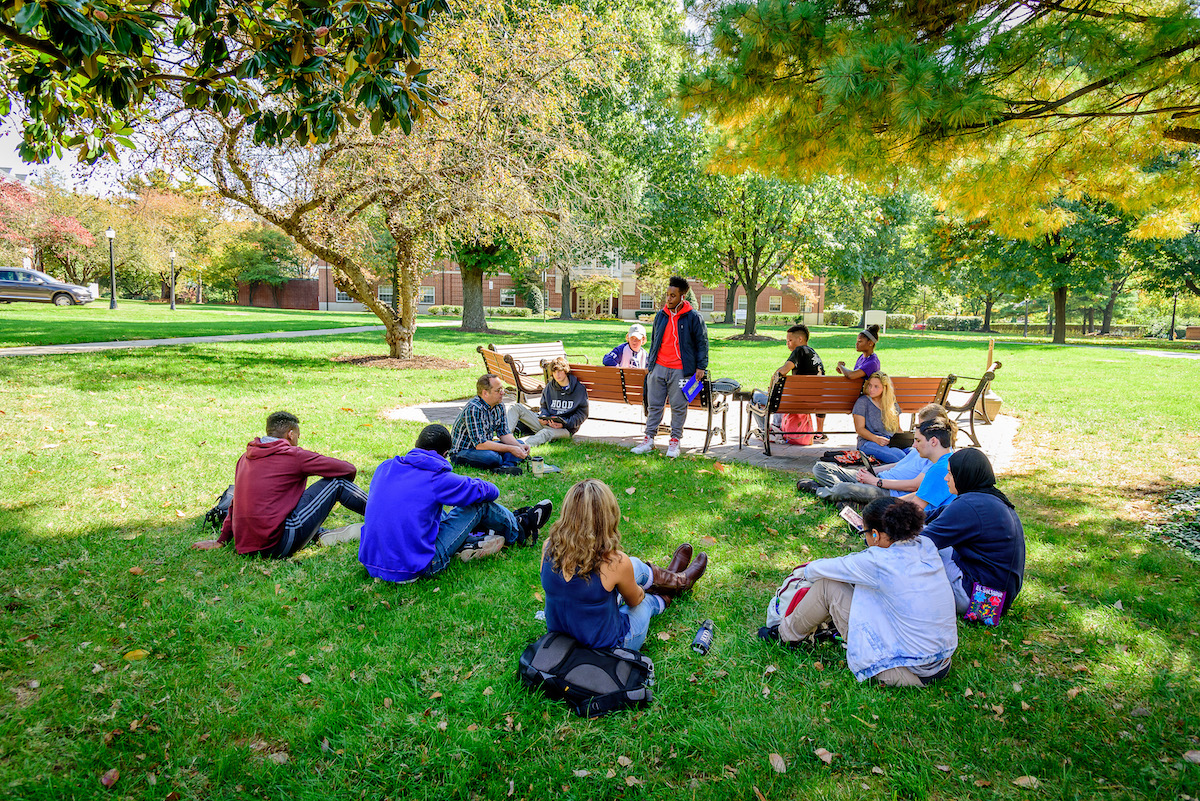Introducing the New Low-Residency MFA in Creative Writing

Hood College is excited to launch the low-residency MFA in creative writing beginning June 2024, a 48-credit program in fiction or poetry that includes four remote mentorship semesters and three 10-day summer residencies.
Inaugural Residency Launches June 2024
Department
- English & Communication Arts
Elizabeth Knapp, Ph.D., program director, discusses the new Creative Writing MFA below.
How did you get the idea for the low-residency MFA at Hood College?
The day of my interview in May 2008 (which was also the last day of classes), as I was walking across campus with my future colleagues, I said to one of them, “You know, this would be a lovely place for a low-residency MFA in creative writing,” and with that, the idea for the program was born. It’s been 15 years in the making now.
What’s unique about Hood College’s low-residency MFA in creative writing?
There are several key features of our program that we think make it stand out:
First, we are the only low-residency MFA in the state of Maryland that offers concentrations in both fiction and poetry; second, our program includes summer residencies on Hood College’s beautiful campus, which is within walking distance of Downtown Frederick (and one hour from Baltimore and Washington, D.C.), with its lively historic district featuring great restaurants, shops and a wonderful independent bookstore; third, for the second of the three summer residencies, students have the option of attending the Prague Summer Program for Writers; fourth, in addition to scholarships and other funding opportunities, we offer students the chance to help launch and serve on the staff of our new online literary magazine, Pergola; fifth, our program focuses on literary publishing, and by the end of the program, students will be submitting their work to literary journals and magazines and may even be starting to publish it; finally, our program features dynamic permanent and guest faculty, including award-winning poets and fiction writers.
Students in the program will play an essential role in its development, and we look forward to welcoming writers from a variety of backgrounds and professions.
Why did you choose to partner with the Prague Summer Program?
The nation’s oldest study-abroad program for creative writers in the English language, the Prague Summer Program has been on our radar since the inception of our program. Now operating as an LLC, the Prague Summer Program had been affiliated for many years with the University of New Orleans and then Western Michigan University. As a Ph.D. student at the latter, I attended the PSP in summer 2005 and served as a teaching assistant for the poet Anne Marie Macari, so I have first-hand knowledge of the program’s outstanding faculty, including two MacArthur Fellows and a National Book Award Winner in fiction. In addition to the option of a three-week second summer residency through the PSP, we’ll also be offering teaching assistantships in the program.
What is the program’s philosophy?
Central to our program’s philosophy is the idea of balance—between writing and the demands of everyday life, between periods of solitude and social interaction—as well as the presence of a diverse and cohesive literary community. The latter in particular is essential to our identity as a program, as we believe that while we may write in solitude, we work together as a community to bring our art into the world.
The idea of balance is also central to the way we’ve structured our program. Our 10-day summer residencies are designed to immerse students in activities and subjects central to the writing life and to foster a sense of community and fellowship with other writers. At the end of the residency period, students return to their individual writing lives reenergized and recommitted to the practice of writing. They then commence a period of concentrated reading and writing in the semester between residencies under the close guidance of a faculty mentor.
Along with the residency experience, literary mentorship is a hallmark of our program. The mentorship semester is designed to help students develop close working relationships with experienced teachers and published authors who can direct them in all matters of literary craft, criticism and publishing. As immersive experiences, the mentorship semesters also provide students with a solid foundation in literary history, theory and practice, and students are expected to read broadly and deeply both within their genre and across genres.
Learn more about the new low-residency MFA in creative writing.
Are you ready to say Hello?
Choose a Pathway
Information will vary based on program level. Select a path to find the information you're looking for!
